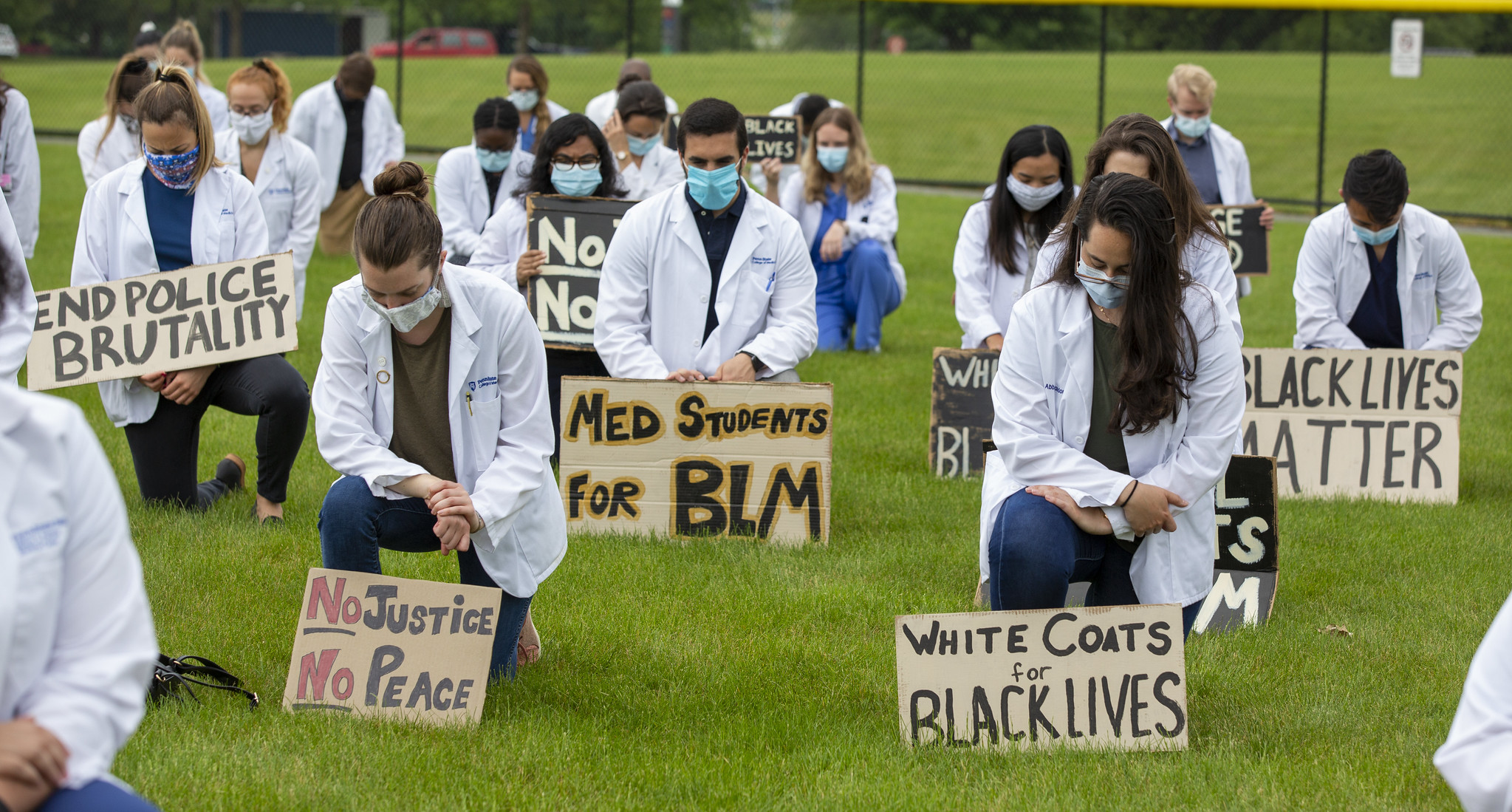College of Medicine, University committed to working toward racial justice

Following the death of George Floyd, Penn State College of Medicine held two town halls on race relations attended by nearly 2,000 faculty, staff and students. Penn State Health held a similar set of town halls addressing employee and patient experiences.
In an email sent after the first town hall, Interim Dean Dr. Kevin Black and Penn State Health CEO Steve Massini noted, “The conversation was deep, powerful, respectful and eye-opening. We are now working on our next steps to build upon those conversations and create action plans that can improve our culture and communications for all whose lives we touch, within our organization and our broader community… This past week has been a learning experience for both of us, and for many of you as well. We are grateful for the courage of our minority colleagues who have shared painful experiences so that all of us can understand how we can do better and be better, individually and collectively.”
What needs to be done
In an email sent June 10, Dean Black outlined nine specific themes or needs for the College of Medicine, identified from the feedback at the large town halls:
- Understanding the experiences of Black and other diverse graduate students
- Identifying structural racism that is included in our curriculum
- Looking at the role of the medical school’s Academic Societies in advancing racial equity amongst students
- Exploring experiences of Black and other racially diverse medical and physician assistant students
- Providing faculty with educational opportunities to understand racism and racial micro- and macroaggressions and their impact on minority students
- Addressing structural and institutional racism at Penn State College of Medicine
- Addressing structural and institutional racism in the broader community
- Creating effective allies against racism
- Improving the experience of Black and other diverse faculty
In his message, the dean noted that he has charged Terry Wolpaw, MA, MD, MHPE, vice dean for educational affairs, and Lynette Chappell-Williams, JD, associate dean for diversity and inclusion and chief diversity officer, with convening a task force to develop comprehensive actions that will move our organization forward, focusing on:
- Better preparing faculty, students and staff to understand and embrace the importance of diversity in the College of Medicine and society
- Incorporating changes into the curriculum for medical students, residents, physician assistant students and graduate students that provide learning experiences to best prepare learners for professional practice that embraces diversity and optimizes the health of those they serve; individuals of all races, religions, ethnicities, gender or gender identification, political beliefs and socioeconomic status
- Working toward creation of an environment in which students can bring complaints of racism and discrimination forward, knowing that they can do so without fear of retribution and that those complaints will be thoroughly evaluated and acted upon appropriately
Taking action
On June 5, faculty, staff and students from Penn State Health Milton S. Hershey Medical Center and the College of Medicine knelt for nine minutes in silent reflection on systemic racism and violence against people of color as part of a White Coats For Black Lives event on campus. The student-led national initiative aims to provide a period of silent reflection for participants regarding the public health crisis of systemic racism.
See more photos from the event here
The Office for Diversity, Equity and Inclusion has scheduled a series of 11 follow-up virtual workshops and information sessions, which are taking place from June 15 to 30. These sessions focus on topics such as “Creating allies against racism,” “Eradicating racism in our organization,” “Creating a culture of inclusiveness” and “Caring for minority and underserved patients.”
A set of the sessions will focus on how to talk to children about racism, with four different sessions targeted at parents of children of different ages. All sesssions will be held via Zoom, and registration is not required.
See details on these events here
University response
Penn State President Eric J. Barron also has announced that University leadership is holding ongoing and critical conversations on issues of bias, hateful speech, and the responsibilities of Penn State and all universities in this time of societal change. Conversations will involve students, faculty and staff, and alumni and residents of communities that surround campuses across Pennsylvania.
Actions include a university-wide, virtual town hall discussion, with more details forthcoming; and a broadcast, live roundtable discussion from 3 to 5 p.m. June 25 with faculty, deans and alumni, led by Marcus Whitehurst, vice provost for Educational Equity and co-sponsored by the Penn State Alumni Association, Development and Alumni Relations, WPSU and the Office of the Vice Provost for Educational Equity. Barron also announced the formation of a Select Penn State Presidential Commission on Racism, Bias and Community Safety, and re-engagement with the University’s Task Force on Policy and Communities of Color, among others.
See President Barron’s June 10 statement here
Reporting incidents of bias
Penn State Health and College of Medicine take incidents of bias seriously and offer a number of resources to help those in the campus community who feel they have experienced bias.
See information on reporting bias here
If you're having trouble accessing this content, or would like it in another format, please email Penn State Health Marketing & Communications.
